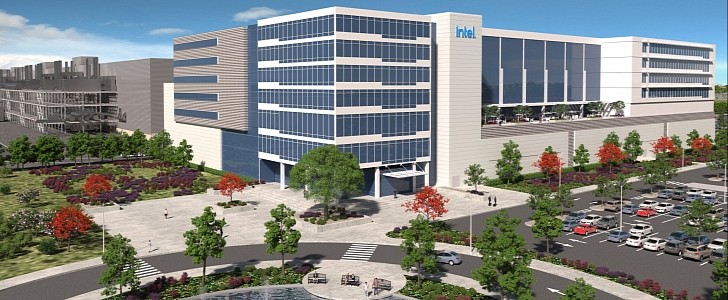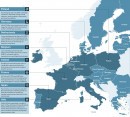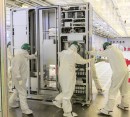The car industry grapples with electronic components shortages that seem to never end, all carmakers being more or less affected. Now the chipmakers are stepping up to ease the pain by building new factories, boosting the existing production capacity. Intel is probably the biggest chipmaker in the world and it just announced expansion plans in Europe with investments totaling $88 billion in six countries across the continent.
The biggest winner of Intel’s investment spree is Germany, where the American chipmaker will build two factories in Magdeburg. This will be the spearhead of Intel chip production in Europe, with plans to produce chips smaller than 2 nanometers, something the company has yet to achieve.
There is no doubt Intel has an eye on the automotive industry, Germany being an important production hub. The investment in Magdeburg will reach 17 billion euros (around $19 billion), creating 7,000 construction jobs, 3,000 permanent jobs at the company, and tens of thousands of additional jobs across suppliers.
Besides Germany, Intel will build a new European research hub in France and is also in talks with the Italian authorities for a chip assembly and packaging plant expected to start operations between 2025 and 2027. All three countries are said to offer big incentives for chipmakers to invest in production facilities.
Intel will also expand its existing chip foundry in Ireland with a 12 billion euros ($13.2 billion) additional investment, as well as increase its lab space in Poland. Besides that, the American chipmaker intends to establish a joint lab with the Barcelona Supercomputing Center in Spain for advanced computing.
Many would question why so many locations were planned to build Intel’s future factories, and the answer is rather simple. Intel is trying to get as many subsidies as possible from the governments in Europe, as the continent vowed to regain its chipmaking prowess. The European Commission set out plans to encourage chip manufacturing in the European Union and promised to ease state aid limitations for chip factories.
“Today 80 percent of chips are produced in Asia,” said Intel CEO Pat Gelsinger for Automotive News. “Our pan-European investment addresses the global need for a more balanced and resilient supply chain. We are planning to bring the most advanced technology to Europe and helping EU create the next-generation European chip ecosystem.”
Intel’s investment plans are the latest announcement by a major chipmaker as the industry tries to catch up with the booming demand for chips. The tiny semiconductor components are vital for the automotive industry, as well as for the consumer electronics sector. There are no easy fixes though, as the new Intel plants would not start production until 2027.
There is no doubt Intel has an eye on the automotive industry, Germany being an important production hub. The investment in Magdeburg will reach 17 billion euros (around $19 billion), creating 7,000 construction jobs, 3,000 permanent jobs at the company, and tens of thousands of additional jobs across suppliers.
Besides Germany, Intel will build a new European research hub in France and is also in talks with the Italian authorities for a chip assembly and packaging plant expected to start operations between 2025 and 2027. All three countries are said to offer big incentives for chipmakers to invest in production facilities.
Intel will also expand its existing chip foundry in Ireland with a 12 billion euros ($13.2 billion) additional investment, as well as increase its lab space in Poland. Besides that, the American chipmaker intends to establish a joint lab with the Barcelona Supercomputing Center in Spain for advanced computing.
Many would question why so many locations were planned to build Intel’s future factories, and the answer is rather simple. Intel is trying to get as many subsidies as possible from the governments in Europe, as the continent vowed to regain its chipmaking prowess. The European Commission set out plans to encourage chip manufacturing in the European Union and promised to ease state aid limitations for chip factories.
“Today 80 percent of chips are produced in Asia,” said Intel CEO Pat Gelsinger for Automotive News. “Our pan-European investment addresses the global need for a more balanced and resilient supply chain. We are planning to bring the most advanced technology to Europe and helping EU create the next-generation European chip ecosystem.”
Intel’s investment plans are the latest announcement by a major chipmaker as the industry tries to catch up with the booming demand for chips. The tiny semiconductor components are vital for the automotive industry, as well as for the consumer electronics sector. There are no easy fixes though, as the new Intel plants would not start production until 2027.












